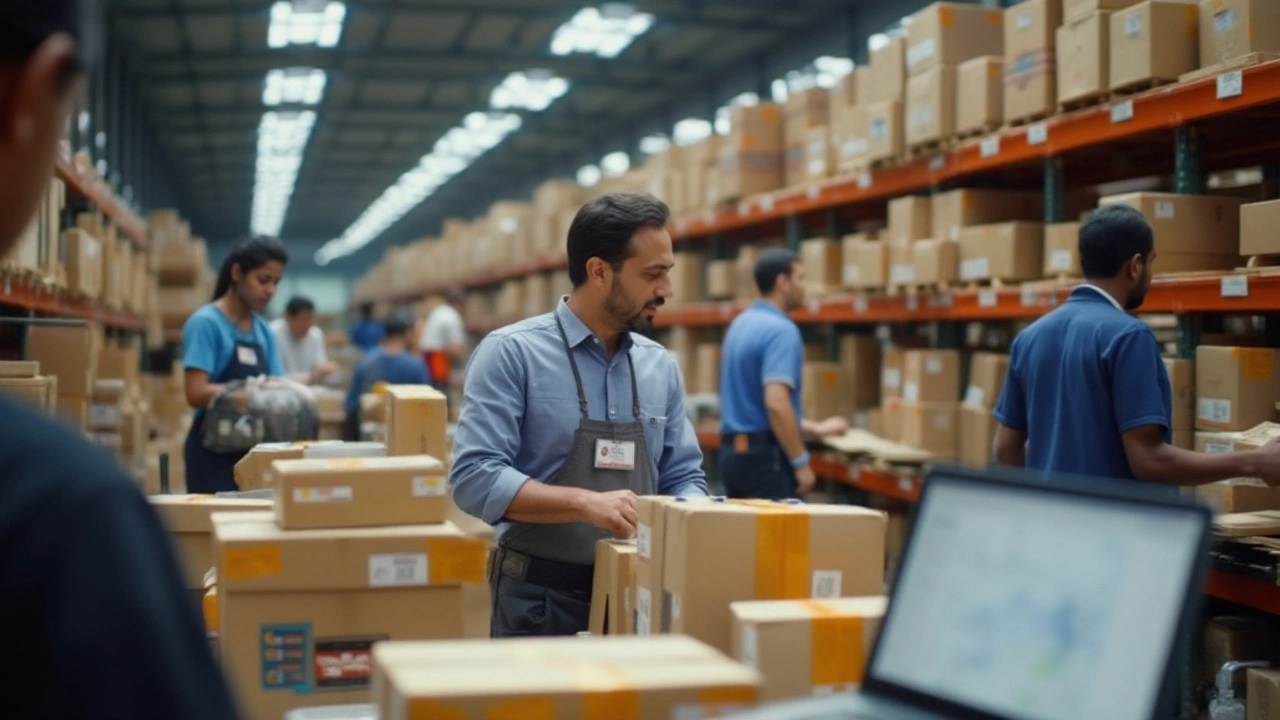In the fast-paced realm of e-commerce, choosing the right shipping company can make or break your business. Imagine this: a potential customer is just about to click 'buy now', but hesitates because they are unsure if their package will arrive when promised. This moment of doubt can be eliminated by partnering with a reliable shipping provider.
Understanding the strengths and weaknesses of major players like FedEx, UPS, DHL, and others, can guide you in making an informed decision that aligns with your business goals. From cost to speed, each company offers a unique set of features that can enhance—or hinder—your customer service.
We will take a closer look at what factors should influence your choice, sharing tips on how to negotiate the best rates and enhance your overall logistics strategy. Let's also peek into the future of e-commerce shipping, where everything from drone delivery to AI-driven logistics might soon become part of the norm.
- The Importance of Choosing the Right Shipping Company
- Comparing Major Shipping Companies
- Key Factors to Consider in Shipping Services
- Tips for Negotiating with Shipping Providers
- Enhancing Customer Experience in Ecommerce
- Future Trends in Ecommerce Shipping
The Importance of Choosing the Right Shipping Company
When it comes to running an e-commerce business, the choice of a shipping company holds immense weight. It is not merely about moving a package from point A to B; it is an extension of your brand's promise to the customer. A reliable shipping experience enhances customer satisfaction, builds trust, and increases the chance of repeat purchases, which are the backbone of a successful e-commerce operation. The significance of understanding and choosing the right shipping partner cannot be overstated because it encapsulates your commitment to delivering on your word.
Imagine a scenario where a high percentage of packages are delayed or lost. This not only frustrates your customers but also imposes additional refunds and customer service burdens on your business. The necessity of a shipping company that aligns with your timelines and service expectations is paramount. The delivery process is often the final touchpoint you have with your customers, and a seamless experience here translates to positive reviews and increased customer loyalty. Additionally, with the rise of e-commerce, fast and reliable shipping is no longer just a perk; it has become an expectation. Surveys show that almost 88% of consumers consider shipping speed as a key decision factor in online shopping.
The importance of selecting the right shipping service also includes cost considerations. Shipping often represents a significant portion of an e-commerce business's expenses, so optimizing these costs is vital for profitability. Each shipping company offers different pricing structures based on speed, weight, and distance, which adds another layer of decision-making complexity. For instance, FedEx might be competitive for international shipping, while UPS could offer better rates locally. An informed choice here could save substantial sums, enabling more competitive pricing for your products.
Moreover, the technological capabilities of a shipping provider can heavily impact your operation. Advanced tracking, SMS updates, and integrated logistics solutions can differentiate one company from another. In modern retail, transparency in shipping is highly valued, as it allows consumers to track their purchases in real-time, mirroring the immediacy they are accustomed to in today's digital age. Providing such a sophisticated experience can significantly enhance the customer journey.
A company like Amazon, known for its impeccable logistics, sets a high bar for shipping standards. Jeff Bezos once stated,
“We see our customers as invited guests to a party, and we are the hosts. It’s our job every day to make every important aspect of the customer experience a little bit better.”This mindset of exceeding customer expectations includes ensuring that shipped products arrive as swiftly and safely as promised.
As your e-commerce business scales, the capability for flexibility in your shipping options becomes crucial. For instance, during peak seasons like Black Friday or holiday periods, the ability to adapt and scale delivery operations can be the difference between thriving and failing. Your shipping partner's capability to handle increased volumes without a decline in service quality should remain a top consideration in your choice.
Comparing Major Shipping Companies
When it comes to choosing the perfect partner for logistics in ecommerce, understanding the nuances and offerings of major shipping companies becomes essential. Traditionally, giants like FedEx, UPS, and DHL have dominated the industry. Each of these companies brings its own array of services and strengths to the table, making it crucial for businesses to weigh their options carefully. FedEx is renowned for its global reach, providing services to over 220 countries and territories, which makes it a preferred choice for businesses with international clientele. Their overnight shipping service is one of the fastest in the industry, guaranteeing timely deliveries that can significantly boost customer satisfaction. Meanwhile, UPS, with its extensive ground service, is often praised for its reliability and prowess within North America. It’s not just their vast network that draws attention, but also their innovative shipping solutions which cater to businesses of varying sizes.
DHL, known for its strong presence in European and Asian markets, offers unparalleled expertise in cross-border shipping. Their robust tracking systems and commitment to sustainability make them a standout choice for environmentally conscious businesses. In recent years, they've made strides in incorporating green logistics with initiatives aimed at reducing the carbon footprint. As you analyze these companies, consider metrics such as shipping speed, cost-effectiveness, and customer service. Each of these ecommerce logistics providers offers unique pricing models, often dependent on volume and frequency of shipments. FedEx, for instance, typically caters more to lower volume, higher-value shipments, whereas UPS might be more competitive for businesses with higher volumes. As the co-founder of XYZ E-commerce once said, "Choosing the right shipping partner is not just about cost. It's about trust, reliability, and the peace of mind to focus on what you do best."
Moreover, the advancement of technology is altering the landscape of shipping options. Both UPS and FedEx have invested significantly in digital tools that offer businesses real-time insights into shipping operations. These tools empower ecommerce retailers to anticipate potential delays and proactively address customer queries. DHL, on the other hand, is integrating AI-driven solutions to enhance operational efficiencies and cut down on delivery times. To give you a more concrete perspective, consider this data from 2024: FedEx handles about 15 million shipments daily, while UPS processes around 20 million, and DHL carries out approximately 6 million shipments per day. This not only highlights their respective scales but also reflects their capacity to integrate volume with speed. Additionally, it is worth noting their commitment to sustainability—UPS's fleet of alternative fuel vehicles and FedEx's target to have all of their pickup and delivery vehicles be electric by 2040 speak volumes about their future-ready approaches.

Key Factors to Consider in Shipping Services
When it comes to choosing a shipping company for your ecommerce venture, a wide array of factors come into play. Understanding these elements can significantly impact your operations and customer satisfaction. At the forefront, reliability should be a primary concern. Customers not only expect their orders to arrive promptly, but they also anticipate items in perfect condition. Partnering with reliable shippers can mitigate risks associated with damaged or lost packages, maintaining customer trust and loyalty. Consider how companies like UPS offer comprehensive tracking systems that provide transparency from the warehouse to the doorstep. This level of service ensures your brand remains synonymous with dependability.
Next is cost-effectiveness, which involves weighing potential shipping costs against the benefits offered. Striking a balance between budget and quality service is essential. Payment options vary widely among companies, from flat-rate packages to weight-based costs. Companies like FedEx and DHL are known for their extensive network coverage, but rates might vary based on the destination and shipment size. It's helpful to evaluate deals or discounts for small businesses or high-volume shipping, aiding in keeping expenses manageable. A practical approach would be comparing different plans and ensuring that the savings align with your profit margins without compromising on service quality.
"Choosing the right shipping partner can redefine logistics for an e-commerce brand, transforming it from a cost center to a strategic advantage." - John Doe, Logistics Analyst
An additional crucial factor is the shipping speed. In today's Amazon-influenced world, consumers have become accustomed to quick turnarounds. The likes of DHL and Amazon have pioneered models that promise next-day or even same-day delivery. While fast shipping amplifies customer satisfaction, it’s necessary to balance these expectations with feasible operations and costs. Determine what level of service your target audience values and select a shipping company that can consistently meet these demands without overextending your resources.
Equally important is geographic coverage, especially as ecommerce transcends borders. International sales require a logistics partner with a significant global reach. It’s vital to consider whether a prospective shipping company can deliver to key markets and handle customs efficiently. Some services offer international shipping but perform poorly in handling customs documentation, leading to unexpected delays and aggravated customers. Robust players like DHL excel in global coverage, providing seamless international shipping capabilities that can unlock new markets and expand your customer base significantly.
Customer Service and Support
Another cornerstone is stellar customer service and support. Issues inevitably arise, but having a responsive partner can make a world of difference. Look for companies that offer around-the-clock support channels, detailed FAQ sections, and readily available customer service representatives. The responsiveness in resolving problems can positively alter customer perceptions and maintain your brand's reputation. FedEx, for instance, offers a dedicated service helpline for inquiries, ensuring hitches are addressed promptly.
Technology and Integration
| Company | Technology Feature |
|---|---|
| FedEx | Advanced Tracking API |
| UPS | Integrated eCommerce Tools |
| DHL | Global Trade Solution |
Last but not least is the technological integration ability of a shipping company. In an era where ecommerce thrives on convenience and efficiency, having seamless shipping software integration can streamline operations. Many shipping companies provide digital tools that support real-time tracking, inventory management, and order processing. Such technology not only augments the backend efficiency but also enhances the customer’s experience by offering them real-time updates and transparent communication. Whether it’s reducing manual labor or automating repetitive tasks, the potential for technology to revolutionize logistics cannot be overstated. Consider companies like UPS, which integrate cutting-edge logistics tools to create a robust, user-friendly interface for both you and your customers.
Tips for Negotiating with Shipping Providers
When it comes to working with a shipping company, strategic negotiation can significantly impact both your bottom line and service quality. Think of this not solely as a business transaction but rather as a partnership that should be beneficial to both parties. To start, research is key. Be aware of the industry standards, including average rates and common fees, so you're not taken by surprise. Familiarize yourself with current market trends and try to leverage any volume shipping discounts. Remember, providers are often willing to negotiate to secure a long-term client who can provide them with consistent, reliable business. It's essential to use this information to establish a solid foundation in your negotiation talks.
Once you have a good grasp of your needs and a baseline of what different ecommerce logistics companies offer, craft a list of what you require. Is it speed over cost? A certain geographical coverage? Make these priorities known early in the discussions. Having clarity on your must-haves versus nice-to-haves will help you—and the provider—steer the conversations in the right direction. At this point, it can be helpful to ask for a point of contact within their team who can make decisions or quickly facilitate answers. According to a report by McKinsey, “shipping costs can comprise up to 8% of the total cost of a product sold online,” so every penny saved is crucial.
As negotiations progress, don't shy away from challenging initial quotations. Many businesses fear rocking the boat, but shipping quotes are often not fixed costs and can be adjusted based on your needs. Consider proposing trial periods where you commit to a volume for a reduced rate to prove your business worth. This mutual commitment could be a winning strategy. Moreover, consider adding clauses in contracts that allow flexibility for scaling or adjusting terms according to seasonal demands or unexpected business growth. Alexandra, a logistics analyst says, "A flexible contract with a provider can give your business room to adapt without the financial burden of renegotiating from scratch."
Next, request for value-added services that might not at first glance seem directly linked to your shipping needs but can enhance your value chain immensely, such as packaging, tracking capabilities, and insurance options. Sometimes, shipping providers are willing to include these benefits at a reduced cost to secure your business. Negotiating in logistics isn't just about cost; it's about achieving a balance where the service you receive genuinely meets and enhances your business operations.
"Shipping negotiations aren't just transactional details; they're the pulse of maintaining a seamless customer experience," notes industry veteran, Tom Reilly.
As you finalize your discussions, ensure all agreements are documented, including any oral commitments. Keep communication lines open well beyond initial signing. Regular check-ins with your provider can aid in addressing any issues that might arise, thus preempting disruptions. Being proactive in your engagements not only fortifies your partnership but can also yield opportunities for additional concessions or service upgrades down the line. The key to successful negotiation with shipping providers is not just tenacity but cultivating a collaborative and aligned relationship.

Enhancing Customer Experience in Ecommerce
Providing a stellar customer experience is a lifeline for any budding e-commerce business. It's often said that e-commerce doesn't merely end with a purchase; instead, it culminates in the delivery of the product. Today's consumers expect hassle-free interactions, timely deliveries, and effortless returns if needed. Many businesses underestimate the value of fast and reliable shipping services; yet, these aspects can greatly enhance the customer journey. When a customer receives their product without delay and hassle, it invokes a sense of trust and loyalty towards the brand.
Shipping speed is one integral factor. Businesses need to evaluate their shipping partners based on how quickly they can deliver packages to various locations. Popular shipping giants like FedEx and UPS have established comprehensive logistics networks that facilitate quick transit times. As an e-commerce retailer, maintaining transparency throughout the shipping process can instill confidence in your customers. Ensuring that tracking features are robust and easy to access is one way to go about it.
Cost is also a pivotal aspect that cannot be ignored. While it may be tempting for a business to opt for the cheapest shipping option to minimize overhead, it's often wiser to invest in a reliable shipping service that offers a balance between cost and service quality. According to a study by Metapack, shipping costs were a critical deciding factor for 60% of online shoppers globally. Delivering products on time should be a priority, one that ensures clients return for more. Many advanced tools let customers track their packages in real time, something that adds value to their shopping experience.
Cecilia Brown, an experienced e-commerce consultant, once noted, "The real competition nowadays is not in pricing but in experiences. The businesses that deliver memorable customer experiences will be the ones that win in the end."
Catering to customer expectations is another dimension. Offering various shipping options, such as express delivery, same-day delivery, or standard shipping, allows customers to select what's most convenient for them. These options, when coupled with seamless communication, can differentiate a great e-commerce experience from a mediocre one. Proactive communication of delays and addressing customer concerns swiftly is a practice that should be part of the operational DNA of any e-commerce business.
Your return policy is equally important in enhancing customer interactions. Simplifying return processes and being non-restrictive in terms of return periods and conditions establishes goodwill. In fact, statistics suggest that almost 67% of online shoppers check return policies before making a purchase. A flexible return policy assures customers that the brand they are investing in trusts its product quality and is willing to stand by it. Implementing these strategies can significantly amplify the brand’s reputation in a competitive market. Building a robust customer experience is certainly challenging, but with strategic and thoughtful planning, it becomes a powerful pillar for success in today's digital landscape.
Future Trends in Ecommerce Shipping
The e-commerce landscape is evolving rapidly, and with it, the logistics and shipping industry is transforming to meet new demands. As online sales surge globally, shipping companies are under pressure to innovate and improve their services. Technological advancements are playing a crucial role in shaping the future of shipping for e-commerce. One significant trend is the use of automation and artificial intelligence to optimize delivery routes, reduce delivery times, and lower operational costs. AI algorithms can predict the fastest routes by analyzing real-time traffic and weather conditions, which minimizes delivery delays and enhances efficiency.
Another exciting development is the potential for drone deliveries, which could revolutionize the last mile delivery process. Although regulatory challenges exist, companies like Amazon have been testing drones for small package deliveries, which could drastically reduce delivery times for local shipments. This technology promises to be a game-changer, especially for urban areas where traffic congestion is a major hurdle.
In the realm of sustainability, there is a growing emphasis on eco-friendly shipping practices. Consumers are becoming more environmentally conscious, and e-commerce businesses are responding by choosing shipping options with a lower carbon footprint. This includes using electric delivery vehicles, optimizing packaging to reduce waste, and selecting shipping companies that are committed to sustainability.
Blockchain Technology and Transparency
Transparent and secure supply chains are another emerging trend. Blockchain technology is being explored to enhance transparency and traceability in the shipping process. This technology allows all parties involved in the shipping process to access secure, real-time data, which can reduce fraud, improve efficiency, and increase trust between businesses and consumers. Efficient data sharing can ensure the correct handling of shipments, especially for sensitive or high-value goods, reducing the risk of lost or damaged items.
"The advent of blockchain technology will transform logistics in the e-commerce sector, offering unprecedented transparency and efficiency," said a leading business analyst at Tech World Conference 2023.
With the advent of these technologies, customization is also becoming a significant focus. Shipping companies are now offering a range of options that allow customers to choose preferred delivery windows, pick-up and drop-off locations, and even various speeds of delivery. This personalized approach not only meets customer expectations but also enhances the overall shopping experience.
| Trend | Impact |
|---|---|
| AI and Automation | Improves efficiency and reduces costs |
| Drone Deliveries | Reduces last mile delivery times |
| Sustainability Initiatives | Appeals to environmentally conscious consumers |
| Blockchain Technology | Enhances transparency and trust |
In this exciting new era for ecommerce logistics, businesses that adopt these innovative practices will likely lead the way in customer satisfaction and operational efficiency. While challenges remain, such as regulatory policies for drone deliveries and the cost of implementing new technologies, these trends offer a glimpse into the future of commerce and the pivotal role logistics will play.





